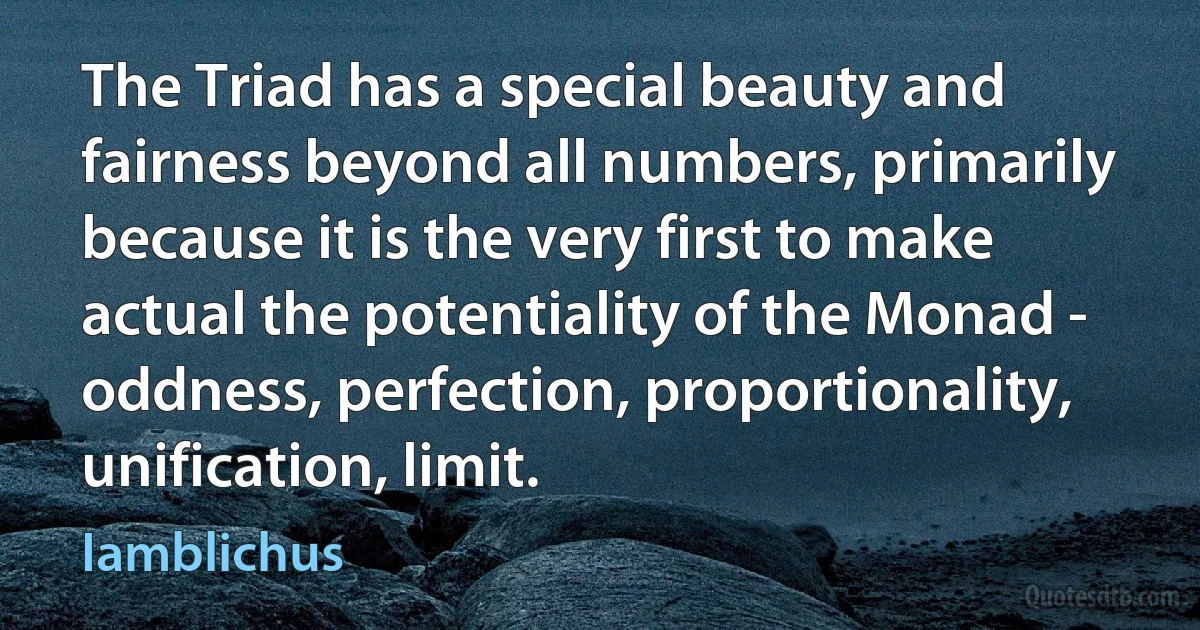Triad Quotes
When people listen to my music, I hope that they will notice that if you take a piece by a composer like Schubert, the major and the minor triad is an extremely important thing not merely as harmony, but in creating melodic lines. Schubert is always walking up and down with arpeggios on C, E, G and so forth. I am not doing anything different really, except using a different system of harmony.

Elliott Carter
I think the origin of all this clamour for tonality is not so much the need to sense a relationship to the tonic, as a need for familiar chords: let us be frank and say "for the triad"; and I believe I have good reason to say that just so long as a certain kind of music contains enough such triads, it causes no offence, even if in other ways it most violently clashes with the sacred laws of tonality.

Alban Berg
With a note of music, one strikes the fundamental, and, in addition to the root note, other notes are generated: these are called the harmonic series...As one fundamental note contains within it other notes in the octave, two fundamentals produce a remarkable array of harmonics, and the number of possible combinations between all the notes increases phenomenally. With a triad, affairs stand a good chance of getting severely out of hand...

Robert Fripp
There's a standard Internet phenomenon (I generalize) of a Sneer Club of people who enjoy getting together and picking on designated targets. Sneer Clubs (I expect) attract people with high Dark Triad characteristics, which is (I suspect) where Asshole Internet Atheists come from - if you get a club together for the purpose of sneering at religious people, it doesn't matter that God doesn't actually exist, the club attracts psychologically f'd-up people. Bullies, in a word, people who are powerfully reinforced by getting in what feels like good hits on Designated Targets, in the company of others doing the same and congratulating each other on it.

Eliezer Yudkowsky
Devin had never trusted the priests of Eanna in his whole life. They were too shrewd, by far the most subtle of the clergy, by far the most apt to steer events to their own ends, which might lie out of sight, generations away. Servants of a goddess, he supposed, might find it easier to take the longer view of things. But everyone knew that all across the peninsula the clergy of the Triad had their own triple understanding with the Tyrants from abroad: their collective silence, their tacit complicity, bought in exchange for being allowed to preserve the rites that mattered more to them, it seemed, than freedom in the Palm.

Guy Gavriel Kay
Which are the arguments and how many are there? I must have an inbred urge toward symmetry. In canvassing for the principal ways of criticizing, assaulting, and ridiculing the three successive "progressive" thrusts of Marshall's story, I have come up with another triad: that is, with three principal reactive-reactionary theses, which I call the perversity thesis or thesis of the perverse effect, the futility thesis, and the jeopardy thesis. According to the perversity thesis, any purposive action to improve some feature of the political, social, or economic order only serves to exacerbate the condition one wishes to remedy. The futility thesis holds that attempts at social transformation will be unavailing, that they will simply fail to "make a dent.”.

Albert O. Hirschman
The achievement of such a change of register through a sequential progression is a familiar procedure in the music of the "common practice." The significant distinction is that where Berg subdivides the registral span into equal, i. e., cyclic, intervals, his tonal predecessors subdivide it, in changing register through sequential transference, into the unequal intervals of the diatonic scale. As I pointed out in my last lecture, however, the qualitative transformation in the language of music which we have experienced in our century has a long prehistory. Beginning with Schubert, we occasionally find normal diatonic functions questioned in changes of key that progress along the intervals of the whole-tone scale, or the diminished-7th chord, or the augmented triad. An even more radical example of a cyclic progression in a tonal composition is...from Wagner.

George Perle
The system in place in the countries of the historic imperialist triad (the United States, Western Europe, Japan) is based on the exercise of the absolute power of the national financial oligarchies concerned. They alone manage the whole of the national productive systems, having succeeded in reducing almost all small and medium-sized enterprises in agriculture, industry, and services to the status of subcontractors for the exclusive benefit of financial capital.

Samir Amin
These oligarchies alone manage the political systems inherited from bourgeois electoral and representative democracy, having succeeded in domesticating the right and left electoral political parties, at the price of eroding the legitimacy of the democratic practice concerned. These oligarchies alone control the propaganda apparatuses, having succeeded in reducing the directors of news organizations including public broadcasters to the status of media clergy in their exclusive service. None of these aspects of the dictatorship of the oligarchy is challenged by the social and political movements at work in the triad, especially not in the United States.

Samir Amin
Instead of engaging in this rather boring academic exercise of opposing Spinoza and Levinas, what I want to accomplish is a consciously old-fashioned Hegelian reading of Spinoza - what both Spinozeans and Levinasians share is radical anti-Hegelianism. My starting hypothesis is that, in the history of modern thought, the triad of paganism-Judaism-Christianity repeats itself twice, first as Spinoza-Kant-Hegel, then as Deleuze-Derrida-Lacan. Deleuze deploys the One-Substance as the indifferent medium of multitude; Derrida inverts it into the radical Otherness which differs from itself; finally, in a kind of "negation of negation," Lacan brings back the cut, the gap, into the One itself. The point is not so much to play Spinoza and Kant against each other, thus securing the triumph of Hegel; it is rather to present the three philosophical positions in all their unheard-of radicality - in a way, the triad Spinoza-Kant-Hegel does encompass the whole of philosophy.

Baruch Spinoza


